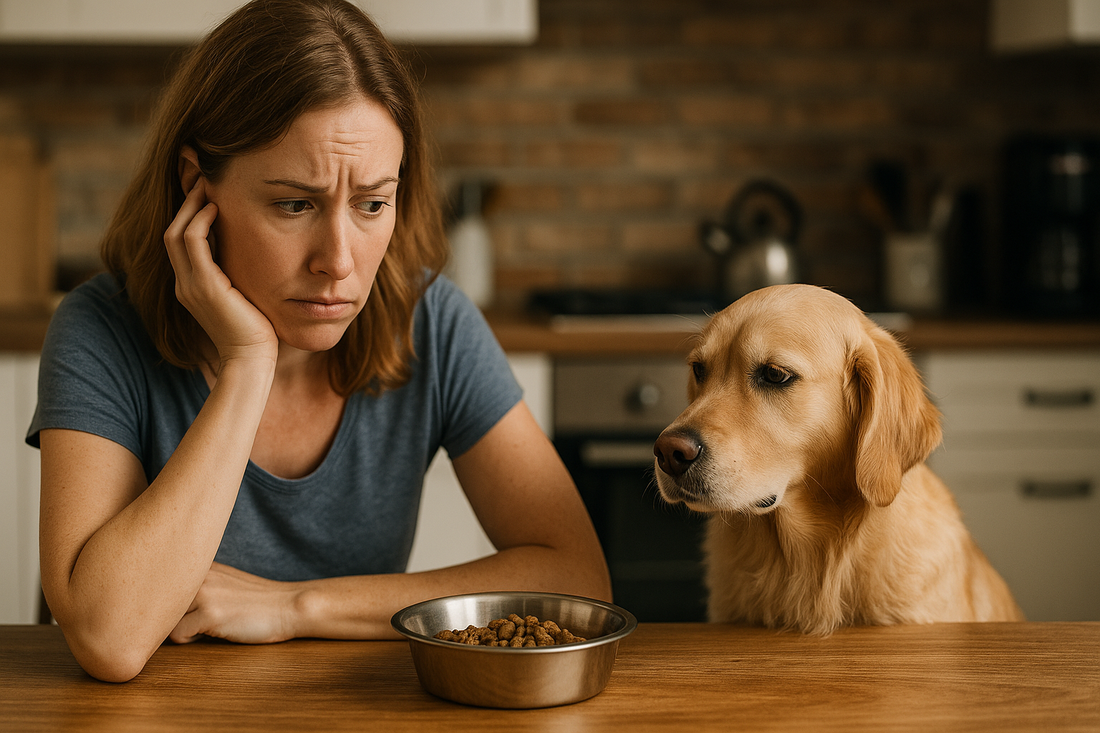
How to Help a dog not eating: 7 Vet-Approved Tips
Share
Dog Not Eating but Acting Normal? 11 Reasons + What to Do
Your dog skipped a meal. Maybe two. Energy looks fine. Tail still wags. You’re asking, “why is my dog not eating but acting normal?” Here’s how to tell if it’s simple, fixable, or needs a vet.
Quick answer: brief appetite dips are common after minor stomach upset, stress, heat, or a routine change. Try small, safe steps for 24 hours. Call your vet sooner if there’s pain, vomiting, diarrhea, or your dog is a puppy, senior, or has a condition.
Start with a 60-second check
- Hydration: gums moist, skin bounces back when you lift it.
- Mouth: cracked tooth, bad odor, red gums, stuck objects.
- Stomach: tight belly, burps, gurgles, or obvious gas.
- Behavior: normal play and bathroom habits?
- Food: any change in brand, flavor, or bowl location?
11 common reasons a dog won’t eat but seems fine
1) Minor stomach upset
Greasy scraps or fast eating can cause brief nausea. Many dogs skip one meal and bounce back.
2) Recent food switch
Sudden changes reduce interest or cause gas. Dogs prefer gradual shifts over 5–7 days.
3) Heat or weather
Hot days drop appetite. Water intake may rise while food intake dips.
4) Stress or routine change
Travel, new people, fireworks, or a moved bowl can pause eating.
5) Dental pain
Cracked teeth, red gums, or tartar make chewing hurt, even if energy is normal.
6) Bowl or feeding area issues
Dirty bowls, strong odors, slippery floors, or a new feeder can turn dogs off.
7) Too many treats
High-value snacks kill meal hunger. Training days often cause this.
8) Bored of the same flavor
Some dogs stall on one taste. A topper or rotation may help if diet allows.
9) Hairball-like nausea in heavy shedders
Swallowed hair can cause mild queasiness. Brushing helps.
10) Mild motion sickness after rides
Even short trips can dull appetite for a few hours.
11) Early sign of illness
Pancreatitis, kidney issues, or infection can start with subtle appetite changes. Watch closely.
What to do today (safe steps)
- Offer fresh water first. Hydration beats food in the short term.
- Skip rich treats for 24 hours. Give the gut a break.
- Warm the regular food slightly. A few seconds boosts aroma. Stir well.
- Try a small topper. Plain boiled chicken or low-sodium broth works for many dogs. (Avoid onions, garlic, heavy fats.)
- Feed in a calm spot. Quiet room, non-slip mat, clean bowl.
- Offer smaller, more frequent meals. Two to three mini portions today.
- Leash walk before meals. Light activity can wake appetite.
- Log what you try. Note time, amount eaten, and any symptoms.
If your dog eats the next meal and stays bright, resume normal feeding tomorrow.
When to call the vet now
- Refuses food for more than 24 hours (or 12 hours for puppies/seniors).
- Vomiting, diarrhea, or belly pain.
- Drooling, pawing at the mouth, or bad mouth odor.
- Lethargy, wobbling, fever, or pale gums.
- Known health issues: diabetes, kidney, liver, or on new meds.
Your vet may check teeth, abdomen, temperature, and hydration. They might run basic labs or recommend a bland diet plan.
Prevention that keeps meals on track
Transition food slowly
Mix 25% new food for two days, then 50%, 75%, and full new by day six.
Protect the mouth
Brush if trained, or use vet-approved dental chews. Book cleanings when due.
Keep a steady routine
Same bowl location, set mealtimes, and a quiet eating space reduce stress.
Watch treat totals
Keep treats under 10% of daily calories. Count training rewards.
Use enrichment
Puzzle feeders, snuffle mats, and sniff walks raise interest in food.
Sample 24-hour plan for a dog that skipped meals
- Morning: offer fresh water; short sniff walk; warm a small portion of usual food.
- Midday: calm rest; no rich snacks; brushing if your dog enjoys it.
- Evening: small portion with a light topper; feed in a quiet room.
- Overnight: check water; note stool and energy for your log.
FAQs
Is it OK if my dog skips a meal?
A healthy adult can skip one meal and act normal. If appetite does not return within 24 hours, call your vet.
Should I change foods right away?
No. Sudden switches can make things worse. Warm the current food first and try small toppers.
What bland diet is safe?
Ask your vet. Many dogs do well on small portions of plain boiled chicken and rice for a short time, then a gradual return to regular food.
Can stress cause appetite dips?
Yes. Travel, loud noise, guests, or a moved bowl can reduce interest in food for a day.
When is it an emergency?
Puppies, seniors, and dogs with conditions should be seen quickly. Also go fast if there is vomiting, diarrhea, pain, or weakness.
Bottom line: brief loss of appetite with normal energy is common. Use the safe steps above for one day. Call your vet if there’s any red flag or no quick improvement.